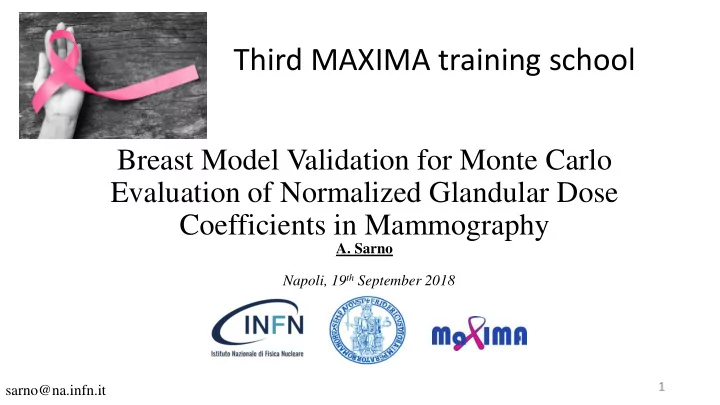

Third MAXIMA training school Breast Model Validation for Monte Carlo Evaluation of Normalized Glandular Dose Coefficients in Mammography A. Sarno Napoli, 19 th September 2018 1 sarno@na.infn.it
Dosimetry in mammography Mean Glandular Dose (MGD) = DgN ( or c·g·s) · K Air kerma at the breast surface Coefficients calculated via MC simulations 2
Breast model assumptions: skin thickness Model from Skin layer (mm) Adipose layer (mm) Dance (1990) 0.00 5.00 Wu et al (1991) 4.00 0.00 BCT experiments 1.45 0.00 Histology 1.45 2.00 3
Skin thickness influence on the MGD Compressed breast thickness = 5 cm; glandular fraction = 20% 100 100*(MGD 1.45 - MGD x )/MGD 1.45 Skin thickness: 5-mm 75 4-mm 3-mm 2-mm 50 25 0 Ref.: 1.45 mm skin thickenss 10 20 30 40 Incident photon energy, E (keV) 4
Skin model influence on the MGD Compressed breast thickness = 5 cm; glandular fraction = 20% 100*(MGD D -MGD 1.45 )/MGD D 0 -20 -40 -60 1.45 mm skin layer vs. 5 mm adipose -80 -100 10 20 30 40 Incident photon energy, E (keV) 5
Breast model assumptions: glandular distribution g × μ en 𝑔 𝐹 g ρ 𝑄𝑠𝑝𝑐𝑏𝑐𝑗𝑚𝑗𝑢𝑧 𝑝𝑔 𝑒𝑝𝑡𝑓 𝑏𝑐𝑡𝑝𝑠𝑐𝑢𝑗𝑝𝑜 𝑗𝑜 𝑢ℎ𝑓 𝑚𝑏𝑜𝑒 = g × μ en g ) × μ en 𝑔 𝐹 g + (1 − 𝑔 𝐹 a ρ ρ 6
20 voxelized patient specific breast phantoms from 3D breast images Mean StdDev Min Max Glandular 23.1 15.3 5.0 54.3 fraction (%) Compressed 5.9 1.5 2.9 7.8 thickness (cm) *Sechopoulos et al 2012, "Characterization of the homogeneous tissue mixture approximation in breast imaging dosimetry." Med. Phys. 7 39 5050-5059.
MC code for breast dosimetry Code based on GEANT4 toolkit -12 x10 Physics list: Option4 20% glandular breast 1.7 MGD per photon (mGy) 5-cm thick Code validated vs AAPM TG195 data This work 1.6 TG-195 1.5 1.4 16.8 keV 30 kVp 8
MC validation for the heterogeneous model 100*(MGD homo - MGD hete )/MGD homo 12 Homogeneous vs. heterogeneous breast model 10 8 Breast thickness = 5 cm 20% glandular 6 4 2 0 10 20 30 40 50 60 70 80 Incident photon energy, E (keV) 9
Technique factors Technique factors W/0.700 mm Al W/0.050 mm Rh Simulated HVL Calculated Simulated Calculated Breast (mmAl) HVL below the HVL (mmAl) HVL below Tube voltage thickness compression the (kV) range (cm) paddle compression (mmAl) paddle (mmAl) 2 3 26 0.399 0.440 0.460 0.488 3 4 27 0.420 0.464 0.471 0.501 4 5 28 0.440 0.486 0.482 0.511 5 6 29 0.459 0.508 0.491 0.521 6 7 30 0.479 0.530 0.499 0.530 7 8 31 0.498 0.552 0.508 0.538 10
Standard models vs. patient specific phantoms 1.4 Homogeneous - to - patient specific ratio 1.3 1.2 Max MGD ratio 1.1 90th percentile Mean = 1.01 1.0 75th percentile 0.9 Mean = 0.89 Median 25th percentile 0.8 10th percentile 0.7 W/Al 0.6 Min Dance model Wu model 11
New models vs. patient specific phantoms 1.4 Homogeneous - to - patient specific ratio 1.3 Max 90th percentile 1.2 1.1 MGD ratio Mean = 0.98 75th percentile Mean = Median = 1.01 1.0 Median 25th percentile 0.9 10th percentile 0.8 0.7 Min W/Al 0.6 1.45 mm skin 1.45 mm skin + 2 mm adipe 12
Standard models vs. patient specific phantoms 1.4 Homogeneous - to - patient specific ratio 1.3 W/Rh 1.2 Max 90th percentile MGD ratio 1.1 1.0 Mean = Median = 0.98 Mean = 0.86 0.9 75th percentile Median 25th percentile 0.8 10th percentile 0.7 0.6 Min D W a u n c m e o m d e o l d e l 13
New models vs. patient specific phantoms 1.4 Homogeneous - to - patient specific ratio 1.3 Max 90th percentile 1.2 1.1 MGD ratio Mean = 0.99 75th percentile 1.0 Median Mean = 0.92 25th percentile 0.9 10th percentile 0.8 0.7 Min W/Al 0.6 1.45 mm skin 1.45 mm skin+2mm adipe 14
Conclusions The skin model in MC simulations presents a large influence on MGD estimates; A simple breast model can produce MGD underestimation up to about 42% when compared to the dose estimates via patient specific breast phantoms; The model proposed by Wu et al (1991) led to the lowest dose overestimation (16%) combined with the highest MGD underestimation (-42%) for a specific breast (W/Rh spectra); Breast model with a 1.45 mm skin thickness and the Dance’s model led to the lowest differences (1%), on average, when compared to patient specific breast phantoms, with respect to Wu’s model (-11%). 15
Thank you!!! Any questions? Third MAXIMA Training school - Napoli 17 th - 19 th September 2018 sarno@na.infn.it 16
Recommend
More recommend